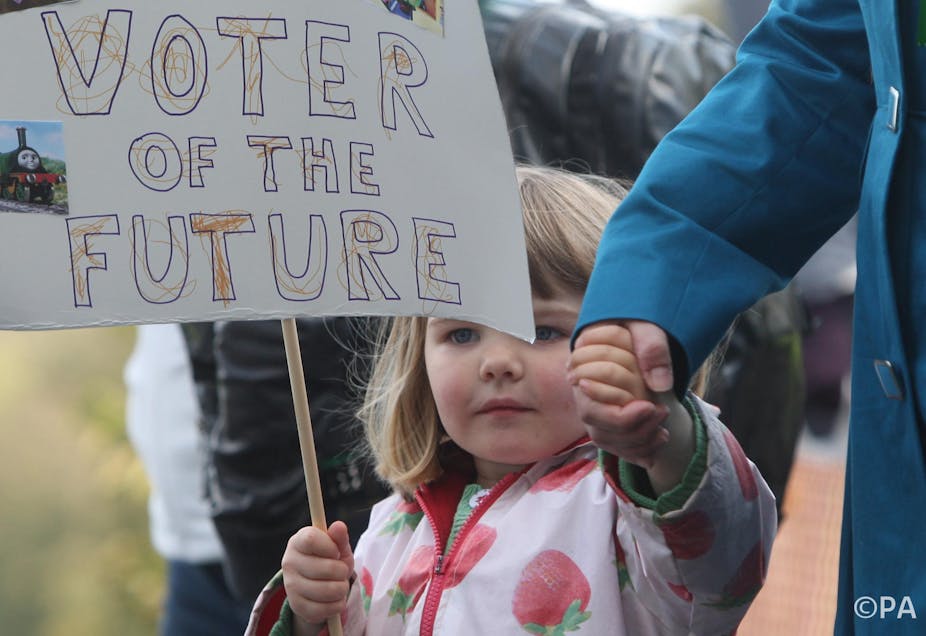Young people have been turned off politics. Only four out of ten 18- to 24-year-olds made it to the ballot box in the last four general UK elections. In the last 20 years, the turnout gap between young and older voters has doubled from about 10 to 20 percentage points.
Many political, media and academic commentators have tried to understand why today’s youth seems more and more detached from public life – and what can be done to get them back in. Drawing on our recent study looking at children’s political engagement in Belgium, we found a simple answer: young people need to be taught more about politics in school.
Political philosopher Meira Levinson has coined the idea of a “civic empowerment gap”: not everyone is equal when it comes to politics. The source of this gap is economic. Or as the political scientist Larry Bartels puts it: “Political influence seems to be limited entirely to affluent and middle-class people”.
The key to close the civic empowerment gap is to engage future generations of voters in politics so that they can become active citizens.
Parents, school and politics
Researchers have established that family plays an important role in socialising children into politics. Some parents deliberately teach their children about politics. Children also often imitate their parents’ socio-political values and voting behaviour. The socio-economic environment in which children grow up plays an important role, too. In homes full of books, children often learn more about the world, which better equips them to have an active part in it.
There is no doubt that children from political families get a head start when it comes to their own political interest and activism. But for children who do not have the advantage of learning about politics at home, civic education at school has an important influence on young people’s political orientations.
In a new study following 3,000 young Belgians between the ages of 14 and 23, we showed that civic education can compensate for the “civic empowerment gap” between young people from privileged and impoverished backgrounds.
In Belgium, formal civic education typically includes lessons about the working of formal institutions such as the Belgian parliament, the European Union or the UN. Children also often discuss current affairs and elections. This is very similar to the content of civics courses in other countries such as the UK.
Making political minds
In our study, we were able to track the family environment of the 3,000 children, for example how often they discussed politics with their parents, and their family’s socio-economic background. We also knew about their school environment and the type of civic education they received. We then measured their political engagement using an index of their interest in politics, discussion about politics and whether they followed politics in the news.
The graph below shows the impact of civic education on the political engagement of four different types of young people. The black lines plot the political engagement for children from privileged families that prepare them to be active citizens. The red lines are for children from homes where politics does not play a role – the groups who we would expect to be disadvantaged. As the graph shows, at the age of 14, children from apolitical family backgrounds (red lines) are much less politically engaged.

The graph also distinguishes between those who received formal civic education (solid lines) and those who did not have school education in politics (dashed lines). Children from apolitical families might start out very disengaged, but civic education in school gives them a proper boost. By the age of 21, they have caught up with their peers from very political families and show similar levels of political engagement. We unfortunately also see that children from disadvantaged family backgrounds who did not profit from civic education in school are permanently left behind in their political engagement.
We found that the amount of formal civic education and the inclusion of group projects had the most influence on the young people’s political engagement. The classroom climate – for example, whether children felt encouraged to develop and express their own opinions, and felt that their teacher presented different points of view – did not play a role.
Empowering young people
Our research confirms that civic education can be key to the development and maintenance of a democratic system in which all citizens have the knowledge, skills, and attitudes to understand and influence their government. In order to reduce the civic empowerment gap, everyone should be part of an enlightened citizenry.
Schools play a crucial role in creating and maintaining civic equality. After all, as a society there is not much we can do about the way parents influence their children at home. But we do have the power to design school education in a way that empowers those that are disadvantaged by their family background.

